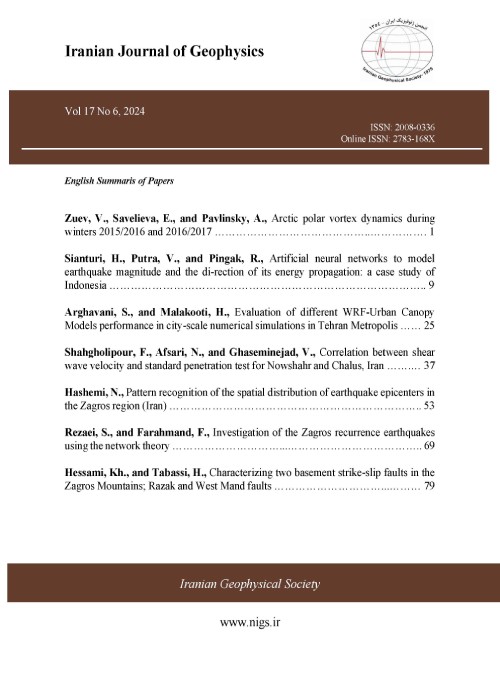Deconvolution of seismic data by applying the Bayes theory
Author(s):
Abstract:
Deconvolution is a longstanding problem in many areas of signal and image processing with applications in astronomy, remote-sensing imagery, medical imaging, and other fields working with imaging devices. It is also one of the major steps of seismic data processing and is studied in the framework of inverse problem theory. It is an ill-posed problem in the sense that the recovered solution (reflectivity series) is unstable and very sensitive to the presence of noise in the data. It is well known that the solution of an ill-posed problem is practically unusable unless taking into account some prior information about the original solution and the accuracy of such information highly affects the quality of the final regularized solution. Mathematically, usability of the prior information is of great importance. The availability and usability of the prior information are two main concerns in solving inverse problems and hence deconvolution. Here, we introduce and develop some priors (in the category of heavy-tailed priors such as Cauchy and Laplace priors) that favor solutions having isolated spikes. One of the main advantages of such priors is that they have less penalization on large spikes corresponding to the true reflection coefficients while severely penalizing small spikes due to the noise and therefore results in a sparse reflectivity series. We then used the Bayes theory to incorporate the prior information into the formulation of deconvolution problems. Therefore, in this study, deconvolution was formulated in the framework of Bayes theory and the regularized solution of the problem was considered as a maximizer of the posterior probability distribution including the likelihood and the prior terms. In contrast to the conventional Wiener deconvolution which results in a minimum L2-norm solution, the methods presented in this paper recover the minimum structure or simple solutions. Sparse or simple solutions are more consistent with true earth reflectivity series, since the earth reflectivity series is simple in the sense that most of its coefficients are zero. The non-zero coefficients identify and quantify the impedance mismatches between different geological layers that are of great interest to the geophysicist.After formulating the deconvolution as a general cost function which can be convex or non-convex, we study an alternative method of determining its minimizer, as the limit of an Iteratively Re-weighted Least Squares (IRLS) algorithm. The IRLS algorithm benefits from simplicity and is easy to be coded. Furthermore, it is shown that its convergence to a local minimum from any initial guess is guaranteed and the convergence rate is superlinear. The main step of the proposed IRLS finds, for a given diagonal weight matrix Q, the solution of a weighted zero order quadratic regularization where matrix Q is updated at each iteration. Moreover, using different priors about the reflectivity series results in only a simple change of the definition of matrix Q.Numerical experiments with synthetic and field data show that the proposed sparsity-based deconvolutions estimate the reflectivity with good resolution. Therefore, they can be used for accurate delineation of the thin layers in real poststack seismic data. The numerical results also show that the proposed methods perform much better than conventional Wiener deconvolution in the sense of the reconstruction error.
Keywords:
Deconvolution , Bayes theory , ill , posed problems , IRLS
Language:
Persian
Published:
Iranian Journal of Geophysics, Volume:6 Issue: 3, 2013
Pages:
17 to 30
magiran.com/p1093700
دانلود و مطالعه متن این مقاله با یکی از روشهای زیر امکان پذیر است:
اشتراک شخصی
با عضویت و پرداخت آنلاین حق اشتراک یکساله به مبلغ 1,390,000ريال میتوانید 70 عنوان مطلب دانلود کنید!
اشتراک سازمانی
به کتابخانه دانشگاه یا محل کار خود پیشنهاد کنید تا اشتراک سازمانی این پایگاه را برای دسترسی نامحدود همه کاربران به متن مطالب تهیه نمایند!
توجه!
- حق عضویت دریافتی صرف حمایت از نشریات عضو و نگهداری، تکمیل و توسعه مگیران میشود.
- پرداخت حق اشتراک و دانلود مقالات اجازه بازنشر آن در سایر رسانههای چاپی و دیجیتال را به کاربر نمیدهد.
In order to view content subscription is required
Personal subscription
Subscribe magiran.com for 70 € euros via PayPal and download 70 articles during a year.
Organization subscription
Please contact us to subscribe your university or library for unlimited access!


